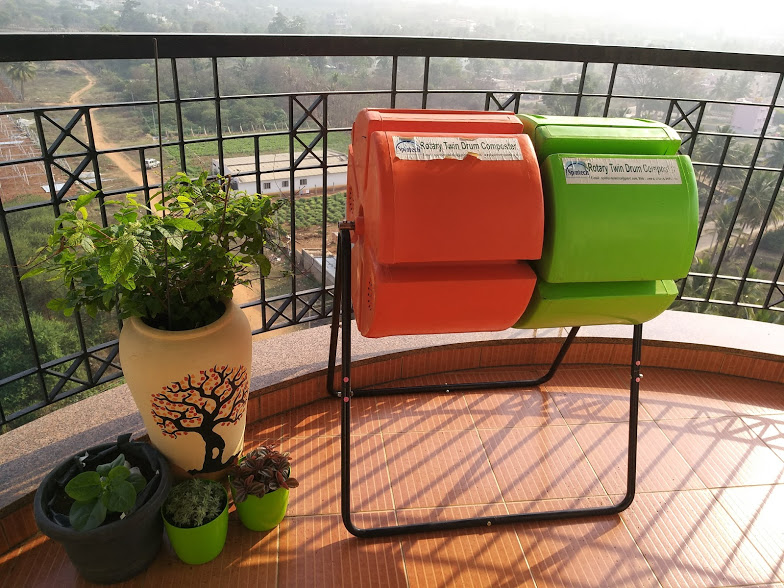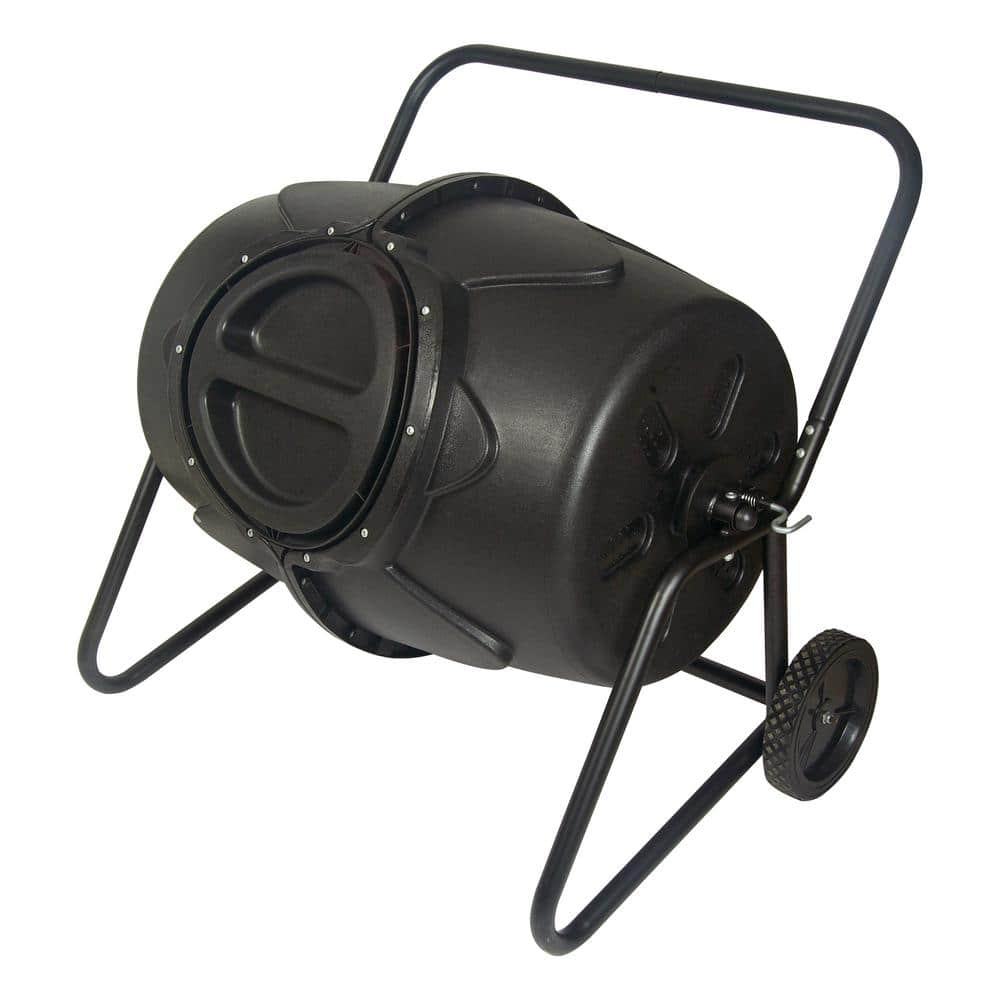Rotary Composter: The Easiest Way To Make Compost
Title: Rotary Composter: The Easiest Way to Make Compost
Introduction:
Composting is the process of turning organic materials into a nutrient-rich soil amendment called compost. It's a great way to reduce your waste, improve your soil quality, and save money on fertilizer.
There are many different ways to compost, but rotary composters are one of the easiest and most convenient methods. Rotary composters are essentially large barrels that are divided into two or more chambers. The waste materials are placed in one chamber, and the barrel is rotated regularly to mix the materials and aerate the compost. This helps to speed up the composting process and produce high-quality compost in a shorter amount of time.
Main Content:
How Rotary Composters Work
Rotary composters work by rotating the waste materials inside the barrel. This mixing action helps to aerate the compost, which is essential for the decomposition process. The rotation also helps to distribute moisture evenly throughout the compost pile, which prevents it from becoming too wet or too dry.
Types of Rotary Composters
There are two main types of rotary composters: single-chamber and dual-chamber. Single-chamber composters are the simplest type and are typically made from plastic or metal barrels. Dual-chamber composters have two separate chambers, which allows you to compost different types of waste materials or to have one chamber that is actively composting while the other chamber is being filled.
Benefits of Using a Rotary Composter
There are many benefits to using a rotary composter, including:
- They are easy to use and maintain.
- They can be placed in a variety of locations, including on patios, decks, and even indoors.
- They produce compost quickly and efficiently.
- They can be used to compost a variety of waste materials, including food scraps, yard waste, and paper products.
- They help to reduce waste and improve soil quality.
How to Choose a Rotary Composter
When choosing a rotary composter, there are a few factors to consider, including:
- Size: The size of the composter will depend on how much waste you generate. If you have a small household, a single-chamber composter may be sufficient. If you have a larger household or generate a lot of waste, you may need a dual-chamber composter.
- Material: Rotary composters are typically made from plastic or metal. Plastic composters are lightweight and easy to move, but they can be more susceptible to damage. Metal composters are more durable, but they can be heavier and more difficult to move.
- Features: Some rotary composters come with additional features, such as aeration vents, drainage holes, and lids with locking mechanisms. These features can be helpful, but they are not essential.
How to Use a Rotary Composter
To use a rotary composter, simply add your waste materials to the barrel and rotate it regularly. The frequency of rotation will depend on the size of the composter and the amount of waste you generate. In general, you should rotate the composter at least once a week.
As the compost decomposes, it will become lighter and easier to turn. Once the compost is finished, you can remove it from the barrel and use it to improve your soil quality.
Conclusion
Rotary composters are a great way to make compost quickly and easily. They are easy to use and maintain, and they can be placed in a variety of locations. If you are looking for an easy way to reduce your waste and improve your soil quality, a rotary composter is a great option.
Are you interested in learning more about rotary composters? Visit Home Gardening for a comprehensive guide on this type of composter. The website covers everything you need to know, from the different types of rotary composters available to the steps involved in using one. You can also find helpful tips and advice on how to choose the right rotary composter for your needs.
FAQ of rotary composter
What is a rotary composter? A rotary composter is a type of composter that uses a rotating drum to mix and aerate the compost materials. This helps to speed up the composting process and produce high-quality compost.
How does a rotary composter work? The compost materials are placed in the rotating drum. As the drum rotates, the materials are mixed and aerated. This helps to break down the materials and promote the growth of beneficial microbes. The compost is typically ready to use in 3-6 months.
Do I need worms for a rotary composter? No, you do not need to add worms to a rotary composter. The rotating drum will provide enough aeration and moisture to promote the composting process. However, you can add worms if you like. Worms can help to break down the materials even faster and produce a finer compost.
What are the benefits of using a rotary composter? Rotary composters have several benefits over traditional compost piles. They are more compact and take up less space. They also produce compost more quickly. Rotary composters are also easier to use and maintain.
What are the drawbacks of using a rotary composter? Rotary composters can be more expensive than traditional compost piles. They can also be more difficult to find. Additionally, rotary composters can be noisy when they are rotating.
Where can I buy a rotary composter? Rotary composters can be purchased from a variety of retailers, including garden centers, online retailers, and home improvement stores.
Image of rotary composter
- A large rotary composter made of metal. The composter is cylindrical in shape and has a door on one end. It is sitting on a concrete pad and is surrounded by grass.

- A small rotary composter made of plastic. The composter is barrel-shaped and has a lid with a handle. It is sitting on a wooden pallet and is surrounded by flowers.

- A community-sized rotary composter made of wood. The composter is large and has a door on one side. It is sitting on a dirt ground and is surrounded by trees.

- A backyard rotary composter made of concrete. The composter is small and square-shaped. It is sitting on a concrete patio and is surrounded by plants.
- A worm bin rotary composter made of plastic. The composter is cylindrical in shape and has a lid with air holes. It is sitting on a table and is surrounded by books.

- A solar-powered rotary composter made of metal. The composter is cylindrical in shape and has a solar panel on top. It is sitting on a concrete pad and is surrounded by flowers.
- A vertical rotary composter made of metal. The composter is cylindrical in shape and stands upright. It has a door on one end and is surrounded by plants.

- A dual-chamber rotary composter made of plastic. The composter is barrel-shaped and has two chambers. It is sitting on a wooden pallet and is surrounded by flowers.
- A portable rotary composter made of plastic. The composter is small and square-shaped. It has wheels and a handle so that it can be easily moved. It is sitting on a concrete patio and is surrounded by plants.

- A DIY rotary composter made of wood. The composter is cylindrical in shape and has a door on one side. It is made from recycled wood and is sitting on a dirt ground.

Post a Comment for "Rotary Composter: The Easiest Way To Make Compost"